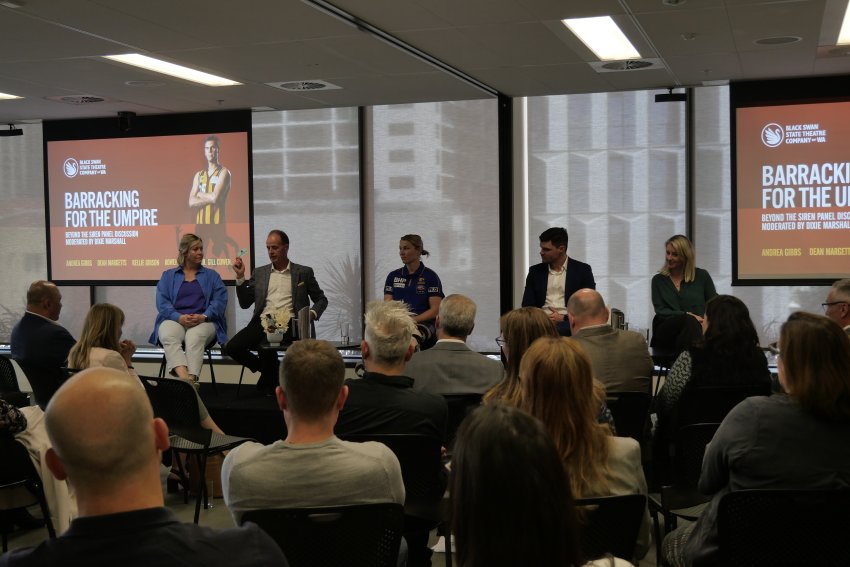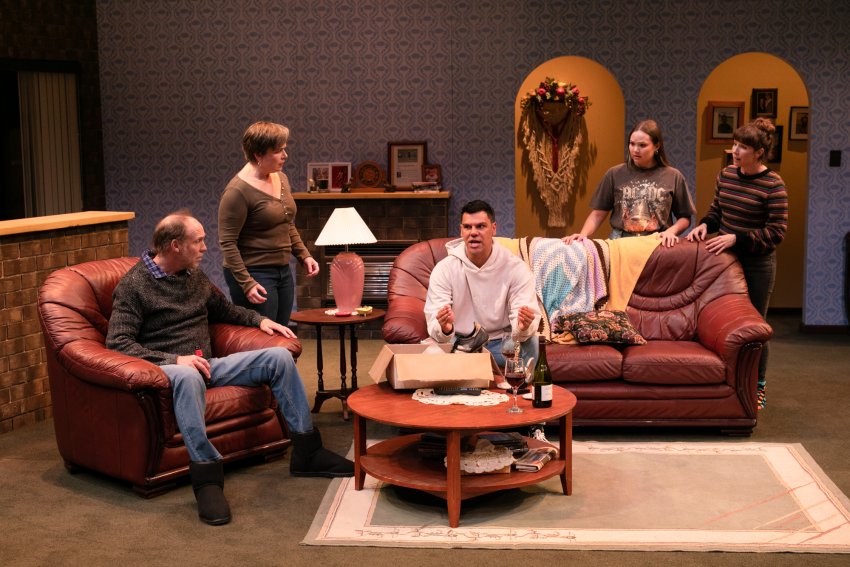
Barracking for the Umpire
By Andrea Gibbs
Starring Steve Le Marquand, Pippa Grandison, Joel Jackson, Ian Wilkes, Michael Abercromby, Ebony McGuire, Jo Morris
Black Swan Theatre Company, Perth.
At the Subiaco Community Arts Centre until October 23
The long-term effects of sports-acquired concussion is increasingly topical in Australia. Perth’s Black Swan Theatre Company has highlighted the issue both in the moving play, Barracking for the Umpire, and by hosting a public panel discussion of sports players and experts called Beyond the Siren.
Barracking for the Umpire exposes the issue as it surfaces within one passionate footballing family in Western Australia’s regional town of Donnybrook — playwright Andrea Gibbs’ home town.
As Delveen (Pippa Grandison), the wife of retired footy legend Doug Williams (Steve Le Marquand), says early in the play: “Footy’s a religion. Having it described as ‘just sport’ doesn’t do it justice … It’s Australia’s beautiful game.”
The play centres on the social bonding beginning in childhood where local champions such as Doug cast giant shadows long after they retire from the field. The bonds are essential to small country towns and cement families together.
Besides the question of injury, the play touches on other aspects of Australian Football League (AFL) reality. Should a gay player come out publicly about his sexuality? Are women sports journalists condemned by sexism to second-rate careers? Do women surrender their identities in supporting the hero players?
In an environment where men are encouraged towards self-denying, toxic masculinity; how can a family cope with the mental and physical decay of the husband and father they all love?
Barracking for the Umpire is a superb piece of writing. The ensemble cast works its way from a gentle, humorous look at families and secrets to a devastating portrayal of the cost of sporting heroism.
Particularly notable is the ghostly coach (Joel Jackson) tormenting Doug during his brain fogs and sleepless nights, demanding that he agonisingly replay all the hard knocks and thumping tackles.
barracking_for_the_umpire_lr_steve_le_marquandpippa_grandisonian_wilkesebony_mcguirejo_morris._photo_by_daniel_j_grant-1768.jpg

The Beyond the Siren panel discussion was moderated by Sports Commissioner Dixie Marshall who pointed out that the federal government gives $350 million to sports every year as opposed to $193 million to the arts. She did not expand on that, but it indicates the industrial scale of sports and raises questions of players as commodities and injuries as workers compensation matters.
Also speaking were Gibbs, AFL umpire Dean Margetts, former West Coast Eagles player Rowen Powell, Youth Olympics gold medallist and West Coast AFLW Player Kellie Gibson and concussion injury specialist, Dr Gill Cowen.
Gibbs shared that her play’s inspiration was her father’s 1960s footballing experience in Donnybrook. She said that safety protocols around concussions back then were virtually non-existent, and her father took terribly hard knocks. Finally, through her mother’s intervention, he gave up playing to become an umpire. The family joke was that her mother was the only person in the stands barracking for the umpire, hence the play’s title.
Twenty-six-year-old Powell has given up his playing career because of repeated concussions, the first of which he suffered while playing at age 12. “Football was my identity,” he said. He reported that he experiences brain fogs and migraines. Now he educates others about the dangers of concussion.
Gibson, who addressed the audience wearing a leg brace as she recovers from an anterior cruciate ligament injury, said younger women players, who have come up through the Oz Kick development system, have been trained better in how to protect themselves and others against concussion.
Cowen explained that it isn’t just “head knocks” that cause concussion. Severe blows to other parts of the body can also shake the head severely enough that the brain is damaged. She brought a broader perspective to the discussion by pointing out that sports-caused injuries comprise about 20% of the concussions in Australia. The biggest proportion is caused by domestic and family violence.
Margetts showed the audience a blue card that the WA Football League has introduced for umpires to get an apparently concussed player off the field. The player can only return if a doctor performs a five-part diagnostic test to certify their fitness. The player who caused the injury must also go off the field for 15 minutes. He hopes that the AFL will introduce the system nationally.
The Black Swan Theatre Company is to be commended not only for the quality of Barracking for the Umpire, but for driving the broader social discussion of the concussion problem.
[Barracking for the Umpire writer Gibbs gives background to the story here.]